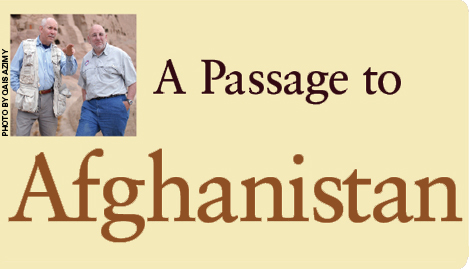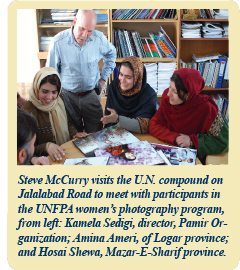
![]()
At right: Photographer Steve McCurry, left, and Arthur Petrosemolo, FDU’s associate vice president for communi-
cations and marketing, in Bamiyan.

hen he asked National Geographic photographer Steve McCurry if he could travel with him to Afghanistan to document his work and help complete a photo exhibit for the United Nations, FDU Associate Vice President for Communications and Marketing Arthur Petrosemolo was prepared for a polite refusal. McCurry always works and travels alone. But to Petrosemolo’s amazement, McCurry said he would welcome him on his next trip.
After a flurry of preparations, the two left New York on March 13 for a 12-hour flight to Dubai in the United Arab Emirates. From there, they boarded Ariana Afghan for a two-hour trip to Kabul.

Petrosemolo was surprised at the extent to which Afghanistan “is a cash economy … no ATM machines, few banks, no credit cards or travelers’ checks. Before we left Dubai, I had to change all my travelers’ checks back into U.S. dollars and stuff my wallet and pockets with cash.”
The revelations would grow more significant. When traveling in Afghanistan, McCurry relies on his in-country contact Qais Azimy, who has a four-wheel drive Toyota and a driver. Upon first entering Kabul, Petrosemolo said he saw “cars traveling on roads mixed with donkey carts and people pushing and pulling homemade carts loaded with goods … no traffic lights or visible police … It is everybody for themselves.”

As he further described, “There is no regular electricity in Kabul so there are hundreds of small generators running in front of stores to supply electricity for lighting. Many homes do not have regular electricity and also use generators … and water does not always run from the tap but is purchased from a truck and pumped into large plastic containers. Welcome to Kabul.”
He particularly recalls children in Kabul following him around selling gum and candy for change.
Petrosemolo said that his guesthouse had a gated courtyard and was protected at the street by two guards with machine guns. Before departing Kabul, he and McCurry stocked up on bottled water and U.S. Army Meals Ready to Eat (MRE), purchased at a grocery store for $1 each.

McCurry and Petrosemolo journeyed to the U.N. complex on the Jalalabad Road, where they met with the participants in the United Nations Population Fund (UNFPA) women’s photography program, which provided training to help boost the skills, income and status of Afghan women. “We interviewed and photographed the women for our exhibit at the U.N. headquarters in New York.”
FDU Magazine Home | Table of Contents | FDU Home | Alumni Home | Comments
©Copyright 2006 Fairleigh Dickinson University. All rights reserved.
For a print copy of FDU Magazine, featuring this and other stories, contact Rebecca Maxon, editor,
201-692-7024 or maxon@fdu.edu.